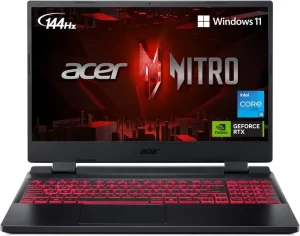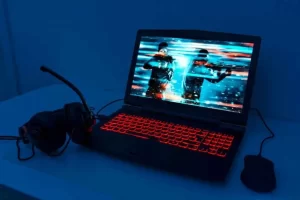Are Gaming Laptops Good For Coding? A Programmer’s Perspective
Gaming Laptops Vs. Traditional Laptops: Which Is Better For Programming?

Yes, Gaming Laptops Good for Programming due to their powerful processors and high-performance graphics capabilities. These laptops offer the necessary computing power and graphics support for running complex coding software and driving multiple displays, which are essential for programmers. “Are Gaming Laptops Good for Programming”
In today’s digital landscape, programming has become an integral part of various industries. From web development to software engineering, having a reliable and efficient laptop is crucial for programmers to carry out their tasks seamlessly. While traditional laptops can handle basic coding tasks, gaming laptops, designed with advanced hardware components, offer several advantages for programmers.
Firstly, gaming laptops are equipped with powerful processors, such as Intel Core i7 or AMD Ryzen 7, which are essential for handling the heavy processing demands of coding software. These processors enable programmers to compile, run, and debug code at a faster pace, resulting in increased productivity. Secondly, gaming laptops often come with dedicated graphics cards, such as NVIDIA GeForce or AMD Radeon, which provide superior visual capabilities.
These graphics cards are valuable for programmers who work with graphics-intensive software or need to run virtual machines for testing different environments. Additionally, gaming laptops are typically designed with larger RAM capacities, allowing programmers to multitask efficiently. This is particularly beneficial when dealing with resource-intensive programs or when running multiple development environments simultaneously.
Furthermore, gaming laptops often come with high-resolution displays, offering programmers sharp and detailed visuals. This can be essential for working with intricate code or analyzing complex data structures.
Gaming laptops are indeed a suitable choice for programming, thanks to their powerful processors, dedicated graphics cards, ample RAM, and high-resolution displays. These features enhance the overall coding experience, enabling programmers to work efficiently and meet the demands of modern programming tasks.
Gaming Laptops Vs. Traditional Laptops
When it comes to selecting the right laptop for programming, you may be torn between a gaming laptop and a traditional laptop. Both options have their own set of strengths and weaknesses, and it’s important to weigh the features of each to make an informed decision. Let’s delve into the specifics of gaming laptops vs. traditional laptops to determine which one is best suited for your programming needs.
Features And Specifications
Gaming laptops are designed with high-quality graphic cards, extensive storage, and advanced cooling systems to support the demands of gaming. They often boast high refresh rates and vibrant displays, making them visually appealing for entertainment purposes. On the other hand, traditional laptops prioritize portability, typically featuring lighter and slimmer designs, longer battery life, and a focus on functionality for general use.
Processing Power
Gaming laptops are renowned for their robust processing power, as they are built to handle resource-intensive gaming applications. They are equipped with powerful CPUs and GPUs, allowing for seamless multitasking and rapid data processing, which can be beneficial for programming tasks. In contrast, traditional laptops may offer more versatility in terms of portability, but often have less powerful hardware that may not fully meet the demands of heavy programming tasks.

Benefits Of Using Gaming Laptops For Programming
Gaming laptops offer several benefits for programming, such as powerful processors and ample RAM for multitasking. The high-performance graphics cards enhance the overall visual experience, making it easier to debug and test code efficiently.
Are gaming laptops good for programming? Absolutely! In fact, using gaming laptops for programming can bring several benefits that can greatly enhance your coding experience. Let’s explore these benefits in detail:
Superior Performance
Gaming laptops are known for their powerful hardware configurations, designed to handle resource-intensive tasks like running high-end games smoothly. This superior performance translates seamlessly into programming as well. With a gaming laptop, you’ll have access to a high-performance processor, ample RAM, and fast storage, allowing you to compile code quickly and efficiently.
Graphics Capability
When it comes to programming, having a gaming laptop with exceptional graphics capability can be a game-changer. While programming may not require heavy graphics processing, it’s still beneficial to have a laptop with a dedicated graphics card. This is especially helpful if you’re working on tasks that involve graphic-intensive applications or if you’re into game development.
Multitasking
As a programmer, you often find yourself switching between multiple applications and running resource-demanding software simultaneously. Gaming laptops excel in multitasking, thanks to their powerful processors and abundant RAM. With a gaming laptop, you can effortlessly handle multiple instances of your integrated development environment (IDE), test environments, and other tools, ensuring a smooth workflow without any frustrating lags or delays.
Expandability
Gaming laptops are built with expandability in mind. You have the flexibility to upgrade and add components as needed, allowing you to future-proof your programming setup. Whether it’s increasing the RAM, swapping out the hard drive for a faster one, or even upgrading the graphics card, a gaming laptop offers the versatility to grow and adapt along with your programming needs.
Challenges Of Using Gaming Laptops For Programming
While gaming laptops are known for their powerful performance and stunning graphics, they also present certain challenges when it comes to programming. Whether you are a professional developer or a programming enthusiast, it’s important to consider these challenges before using a gaming laptop for your programming tasks.
Portability
Gaming laptops are typically larger and heavier than their traditional counterparts. Due to the high-performance components and additional cooling systems required for gaming, these laptops tend to be bulkier, making them less portable for programmers on the go. If you often need to travel between locations or work in different environments, the lack of portability may become a significant hindrance to your productivity. Carrying around a heavy gaming laptop can be cumbersome and may not be ideal for those who rely on their laptops for programming tasks.
Battery Life
In addition to their limited portability, gaming laptops often have shorter battery lives compared to regular laptops. The powerful processors, discrete graphics cards, and high-resolution displays found in gaming laptops consume a significant amount of power, resulting in decreased battery life. This can be a major drawback for programmers who require long hours of uninterrupted coding sessions, especially when access to a power source is limited. Constantly having to search for power outlets or relying on external batteries can be a hassle and disrupt your workflow, reducing your overall productivity.
Cost
Another challenge posed by gaming laptops is their higher cost compared to traditional laptops. The advanced hardware specifications and cutting-edge features in gaming laptops contribute to their hefty price tags. For programmers who may not require the extreme gaming capabilities, investing in a gaming laptop solely for programming purposes might not be a cost-effective decision. Opting for a regular laptop with sufficient processing power and memory could save you a significant amount of money without compromising on performance for your programming tasks.
While gaming laptops offer impressive performance, they come with their fair share of challenges that programmers need to consider. The lack of portability, shorter battery life, and higher cost can impact your productivity and budget. However, if you prioritize performance and prefer a visually appealing display, a gaming laptop may still be a viable option for your programming needs. It ultimately depends on your specific requirements and preferences.

Credit: www.youtube.com
Tips For Choosing A Gaming Laptop For Programming
Gaming laptops can be a great option for programming. They often come with powerful hardware and high-performance components that can handle demanding programming tasks. However, not all gaming laptops are created equal, and there are certain factors to consider when choosing a gaming laptop for programming. Here are some tips for selecting the right gaming laptop for your programming needs.
Processor
The processor is the brain of your laptop and is crucial for running programming software efficiently. Look for a laptop with a high-performance processor such as an Intel Core i7 or AMD Ryzen 7. These processors offer multiple cores and threads, making them suitable for handling complex programming tasks.
Ram
Ample RAM is essential for running multiple programming environments and applications simultaneously. Aim for a gaming laptop with at least 16GB of RAM for smooth multitasking and seamless performance while coding.
Storage
When it comes to storage, consider a laptop with a solid-state drive (SSD). SSDs offer faster read and write speeds, reducing load times and improving overall system responsiveness. A 512GB SSD or higher will provide sufficient space for coding projects and software installations.
Graphics Card
A dedicated graphics card is not the top priority for programming tasks. However, a mid-range GPU such as an NVIDIA GTX 1650 can assist with graphic-intensive programming workloads and provide better overall system performance.
Display
A high-resolution display with good color accuracy is beneficial for programming tasks. Look for a laptop with a Full HD (1920×1080) or higher resolution and an IPS panel for vibrant and accurate color reproduction.
Connectivity
Multiple USB ports, including USB Type-C, and an HDMI output can enhance connectivity options for external devices such as monitors, peripherals, and mobile devices. This allows for seamless integration with programming tools and accessories.

Credit: inpics.net
Frequently Asked Questions For Are Gaming Laptops Good For Programming
Are Gaming Laptops Good For Programming?
Yes, gaming laptops can be good for programming. They often come with powerful processors, ample RAM, and high-resolution displays that are useful for running demanding programming software. However, it is important to consider other factors like battery life and portability when choosing a laptop for programming.
Conclusion
Gaming laptops can be a great choice for programming due to their powerful hardware and high-quality displays. Their graphics cards and processors can handle demanding programming tasks, while their portability makes them convenient for developers on the go. With the right configuration, a gaming laptop can certainly be an excellent tool for programming.




